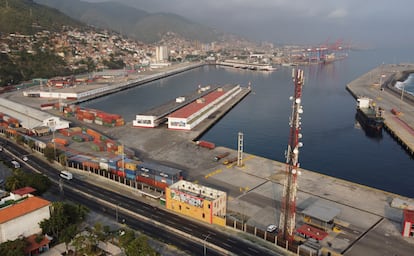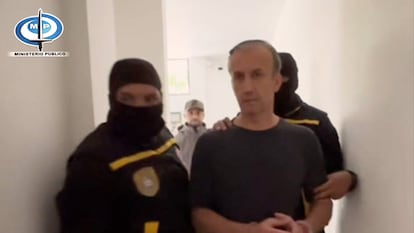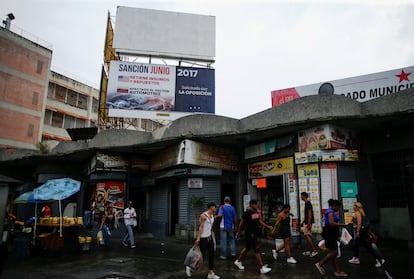How US sanctions have affected Venezuela
Under Obama, Biden and Trump, Washington has introduced economic measures against the Maduro government. Here is an overview of how these moves have impacted the country


The United States has once again turned to economic sanctions as a means of pressuring the Venezuelan government of Nicolás Maduro. On Thursday, Washington reactivated the restrictions on Venezuela’s oil sector that it had lifted six months ago. The move came after opposition candidates, such as María Corina Machado, were disqualified from running for president.
This means that the so-called General License 44, which allowed Venezuela to sell its gas and crude oil in international markets, will not be renewed. But U.S. pressure — which has intensified ahead of the July 28 presidential elections in Venezuela — is nothing new. It spans three White House administrations and has become progressively more complicated. Here is an overview of Washington’s diplomatic struggle with Caracas.
In 2015, under the Barack Obama administration, the U.S. imposed its first measures on the country within the framework of the Venezuela Defense of Human Rights and Civil Society Act, which was intended to punish Venezuelans responsible for violating fundamental rights. These sanctions targeted individuals, including high-ranking members of security forces, such as the Bolivarian Intelligence Service (Sebin), the Bolivarian Police and the National Guard, which were involved in the violent repression of anti-government protests in 2014.
The first economic sanctions date back to 2017. The Treasury Department, under the orders of Donald Trump, imposed restrictions on operations, transactions and negotiations between U.S. entities and persons and the Venezuelan government. This led to a policy of over-compliance in the legal departments of U.S. banks in relation to transactions involving Venezuelan citizens. That year, Venezuela defaulted on its debt payments.
Measures against the state oil company
In the following years, specific sectors and organizations were added to the sanctions list. In 2019, amid the power struggle between Juan Guaidó — who declared he was acting president — and Maduro, Washington hit Venezuela’s state-owned oil company PDVSA, which was greatly weakened by the economic crisis and rampant corruption. For the first time, the United States halted oil exports from Venezuela. Before that decision, it had been a top client of the South American oil company, purchasing around 500,000 barrels a day.
These primary sanctions were backed up with so-called “secondary sanctions,” which threaten to block from the U.S. financial system not only U.S. citizens but also any foreign citizens and entities determined “to have materially assisted, sponsored, or provided financial, material, or technological support for, or goods or services” to Venezuela. This move made it difficult for the PDVSA to sell its crude oil in the international markets, with Venezuela forced to sell it on the oil black market, trading it at great discounts, and resorting to tactics such as the use of shadow fleets for sales, and swapping goods for oil.
Amid these waters full of intermediaries, opaque negotiations created an extensive network of corruption, which the Venezuela government called PDVSA Crypto. To circumvent U.S. sanctions, Venezuela sold crude through cryptocurrency networks. But this scheme ended up embezzling $21 billion, with dozens of officials arrested in the graft case, including Tareck El Aissami, a former oil minister and close ally of Maduro.

Six months of relief
The restrictions on purchasing Venezuelan oil began to ease on February 25, 2022, when Russia invaded Ukraine. With the global energy market rocked by the loss of Russian oil and a new war on the horizon, the United States started to thaw its relations with the Maduro government. Long conversations and at least six meetings in Doha, sponsored by Qatar in parallel to the negotiations with the Venezuelan opposition that had begun a year earlier in Mexico, led to the Barbados Agreements, which outlined a series of political commitments, and the renewal of General License 44.
General License 44 opened the door to the production, extraction, sale and export of oil or gas from Venezuela. But the door began to close at the of January, when the Venezuelan Supreme Court upheld María Corina Machado’s disqualification from running for president. In response, the U.S. Treasury Department ordered all operations with Venezuela’s Minerven oil company — which had been allowed via the 43A license last October — to end before February 13, 2024.
Little impact on the people
The impact of the lifting of sanctions, both on the global energy market and on the street economy in Venezuela, has been limited. Boosting production, after years of disinvestment and mismanagement, has been difficult for PDVSA, which has not managed to significantly increase the number of barrels it produces. Venezuela, a country that once produced more than three million barrels a day, has not exceeded one million barrels per day since the crisis in the state-owned company, which worsened with the U.S. ban on the purchase of Venezuelan oil.
Today, Venezuela produces between 800,000 and 850,000 barrels daily. The cash flow that has entered the coffers of the Maduro government has allowed it to inject dollars into the exchange market to keep inflation at bay. But social spending continues to fall. And the minimum wage has not risen for two years, and today is equivalent to just over $3 a month.

The specific licenses loophole
The easing of sanctions aroused the interest of European, Indian and Chinese oil companies. This same Wednesday, on the eve of the expiration of the license granted last year, PDVSA and the Spanish company Repsol signed an agreement to extend the geographical area of the Petroquiriquire Joint Venture. License 44 — which the United States has decided not to renew in response to the Maduro government’s failure to comply with the Barbados Agreements — has been replaced by License 44A, which gives companies involved a month and a half to close operations. It also opens the possibility for OFAC to consider specific license requests to those interested in continuing operations authorized by the expired license. With this fine print, the United States has decided to not return to the totally closed regime prior to the Barbados negotiations.
“Venezuela, with and without a license, will continue to grow,” said Pedro Tellechea, president of PDVSA, during the signing of the agreement with Repsol. “The license opens the door for Indian, Asian and European companies to come and request their license and continue working with Venezuela,” he added. PDVSA’s reaction is opposite to that of the Venezuela government, which argues that the United States, by not renewing License 44, has failed to comply with what was agreed to in Doha.
Extra time for Chevron
In 2022, the United States issued a first license aimed at easing sanctions on Venezuela. It was one of the first signals from Washington that it would be adjusting sanctions in exchange for progress in the democratization of the country. This license was issued after the Venezuelan opposition and the government returned to the negotiating table in Mexico, after months of stalled talks.
The beneficiary was the U.S. oil company Chevron, which received authorization to resume oil production in Venezuela and start projects for new fields. On this license, which has been renewed every six months, the United States has not yet made a decision, so it could remain in force. The 8M general license, which allows limited transactions until May 16, 2024, with Halliburton, Schlumberger Limited, Baker Hughes Holdings LLC and Weatherford International, also remains in force.
Sign up for our weekly newsletter to get more English-language news coverage from EL PAÍS USA Edition
Tu suscripción se está usando en otro dispositivo
¿Quieres añadir otro usuario a tu suscripción?
Si continúas leyendo en este dispositivo, no se podrá leer en el otro.
FlechaTu suscripción se está usando en otro dispositivo y solo puedes acceder a EL PAÍS desde un dispositivo a la vez.
Si quieres compartir tu cuenta, cambia tu suscripción a la modalidad Premium, así podrás añadir otro usuario. Cada uno accederá con su propia cuenta de email, lo que os permitirá personalizar vuestra experiencia en EL PAÍS.
¿Tienes una suscripción de empresa? Accede aquí para contratar más cuentas.
En el caso de no saber quién está usando tu cuenta, te recomendamos cambiar tu contraseña aquí.
Si decides continuar compartiendo tu cuenta, este mensaje se mostrará en tu dispositivo y en el de la otra persona que está usando tu cuenta de forma indefinida, afectando a tu experiencia de lectura. Puedes consultar aquí los términos y condiciones de la suscripción digital.








































